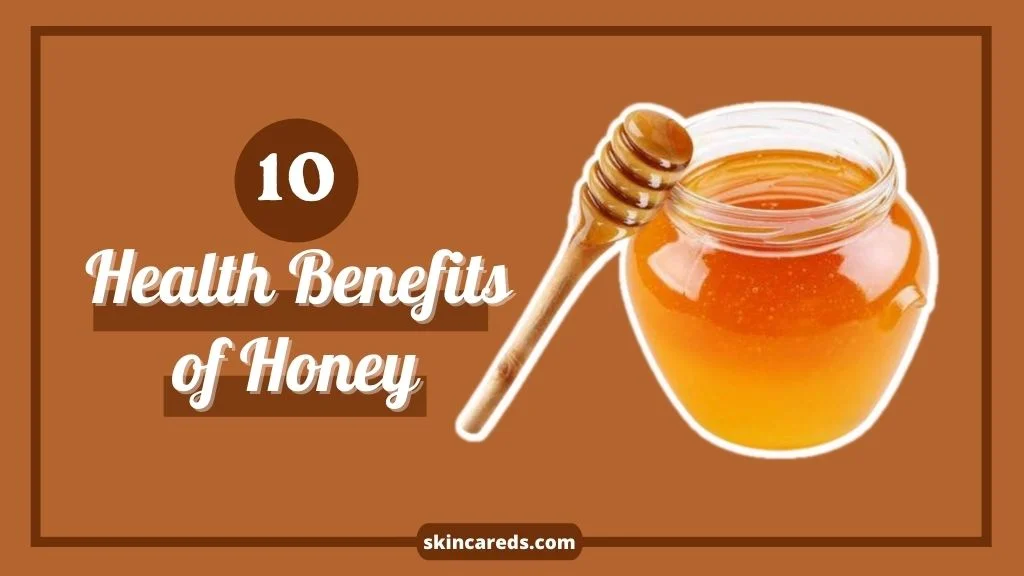10 Surprising Health Benefits of Honey: Honey is a natural component that is utilized for its sweetness, vitality, and possible health advantages. It is primarily consumed by humans as pure honey or as an ingredient in various food products like sweets, cereals, and drinks.
Depending on the botanical origin, there are hundreds of distinct honey varieties, such as clover, acacia, or manuka. Today’s essay is about the 10 surprising health advantages of honey.
First, read my whole article then if you are interested, you can buy this Honey from various online stores. In today’s post, I will show you the 10 surprising health benefits of Honey & 100% natural Honey which is the top-selling natural food on Amazon’s online shopping store.
1. What is the process of making honey?
Flower nectar is the starting point for the journey from bee to bottle. Honeybees collect nectar, which is broken down into glucose and fructose by enzymes in bee saliva and stored in honeycombs to feed the hive over the winter.
Excess water in the honeycomb is evaporated by the bees’ wings constantly fanning. Honey is the viscous, sticky liquid that results from this process.
Spain, Germany, Romania, and Hungary produce the most honey in the European Union. However, because good honey production relies on the honeybee prospering, the fact that Europe is facing a large reduction in bee colonies (21 percent in just a winter of 2016/2017) is cause for alarm.
2. Bees and Their Importance
Honeybees are significant crop pollinators in addition to producers of honey. Because pollination is necessary for 84 percent of EU crops, the European Commission devised a Honeybee Health Strategy.
Pesticides may be one of the factors contributing to the decline of bees, prompting the European Food Safety Authority (EFSA) to issue guidance on assessing the potential risks of pesticides to bees and, more recently, to work on the creation of a database to actively collect information on bee health in Europe.
3. Honey’s various varieties
Honey comes in approximately 300 different varieties around the world. Depending on the plant from which bees collect nectar, they range in color, smell, and flavor. Manuka and acacia honey are two of the most well-known varieties of honey. Honey is divided into two types: raw and processed honey.
Honey is frequently strained after it is taken from the beehive to remove wax and other non-honey particles. It can then be purchased as raw honey, which can then be boiled and bottled to become processed honey, which is the most common form seen in supermarkets. Potential viruses, as well as vitamins and antioxidants, are removed during the boiling and bottling process.
4. The Nutritional Composition of Honey
Season, climatic conditions, processing procedures, and flower nectar variations can all influence the composition of honey, however, carbohydrates are the most important nutritional elements (simple sugars: fructose and glucose).
In addition to water, honey contains very small amounts of protein, vitamins, minerals, trace elements, enzymes, and polyphenols, including flavonoids from pollen, which can help identify the honey’s origin.
The European Council Directive 2001/110/Ec of December 20, 2001, regulates the composition parameters for honey, stating that the maximum water content of honey must be 20% for it to be considered an authentic food product.
Honey is usually a smooth liquid with small imperceptible crystals that are difficult to notice. Crystallization can be caused by a variety of variables, including its origin, low storage temperature, longer storage time, and increased glucose content.
Larger crystals form and the texture becomes crunchy. Gentle heating can momentarily reverse the process. Heating and filtering honey, on the other hand, can damage its qualities by darkening the color, damaging enzymes, and eliminating health-promoting antioxidants.
10 surprising health benefits of honey
1 Honey prevents cancer and heart disease.
Honey contains flavonoids, antioxidants that help reduce the risks of some cancers and hard diseases.
2 Reduce ulcers and other gastrointestinal disorders.
Honey treatment has been shown to help with diseases in a recent study. Such as ulcers and bacterial gastroenteritis. This may be related to the third benefit.
3 Anti-Bacterial Anti-Fungal
Because bees contribute an enzyme that produces hydrogen peroxide, all honey is antibacterial. Said Peter Molan, director of The Honey Research Unit at the University of Waikato in New Zealand.
4. Increase athletic performance
Honey and dried figs were used by ancient Olympic competitors to improve their performance. Modern studies have now confirmed this. It is better than other sweeteners in terms of maintaining glycogen levels and boosting recovery time.
5. Reduces a Cough and Throat Irritation
It helps with coughs, particularly buckwheat honey. A single dose of buckwheat honey is just as effective as a single dose of dextromethorphan in relieving nocturnal cough and permitting good sleep in a study of 105 children.
6. Balance the Five Elements
It’s been used in Ayurvedic medicine for at least 4000 years in India, and it’s thought to help with all three of the body’s core material imbalances. Honey can help with eyesight, weight loss, impotence and premature ejaculation, urinary tract diseases, bronchial asthma, diarrhea, and nausea, just to mention a few health benefits. Honey is known as “Yogavahi” because it can penetrate the body’s deepest tissues. When honey is combined with other herbal remedies, it improves their medicinal properties while also helping them in reaching deeper tissues.
7. Blood Sugar Regulation
It is not the same as white sugar or artificial sweeteners, even though it contains simple sugars. Its perfect combination of fructose and glucose aids in the body’s regulation of blood sugar levels. Some honey has a low hypoglycemia index, which means it won’t spike your blood sugar.
8. Heal Wounds And Burns
Honey’s health benefits extend to external applications as well. Honey is just as effective as silver sulfadiazine when applied to the skin. This effect is thought to be caused by a combination of the drying impact of simple sugars and honey’s antimicrobial properties. It has been shown in studies to be particularly effective in the healing of wounds.
9. Probiotic
Some vertices have a lot of friendly bacteria on them. This includes up to six lactobacilli species and four bifidobacteria species. Many of honey’s “secret medicinal powers” could be explained in this way.
10. Strengthen the Immune System
According to a study performed at Cardiff University’s School of Medicine, manuka honey stimulates the production of immune cells. Manuka honey is one of our favorites.
Types of Honey
- Manuka honey boosts your immune system. Kiva Certified UMF 15+ – Raw Manuka Honey 15+ is raw and lab-certified to the UMF 15+ standard. This is authentic Manuka Honey from New Zealand’s distant highlands, forests, and coastal areas.
- Buckwheat is a healthier alternative to cough syrup and has anti-inflammatory properties.
- Topanga is a wildflower. Wildflower honey of high quality is raw, unfiltered, and unpasteurized. It’s also kosher.
- Stockin’s Unheated and Unfiltered Raw Alfalfa Honey is created from Alfalfa Blossoms in Saskatchewan, Canada.
- Of all kinds of honey, Black Locust has the lowest glycemic index (32). The Beekeeper’s Daughter’s Raw Locust Honey is light, clean, aromatic, and flowery.
- Blueberry
- Orange Blossom
- Clover: Honey fans rated Uncle Henry’s Honey the best taste, and it comes from Canada’s purest wildflower fields.
FAQ(Frequently Asked Questions)
How Much Honey a Day?
Honey has no specific daily intake recommendation, however because of its high sugar content, it should be consumed in moderation. Free sugars (which include all monosaccharides and disaccharides added to foods by manufacturers, cooks, or during home cooking, as well as sugars naturally present in honey, syrups, and fruit juices) should make up no more than 10% of a person’s daily energy intake, according to the World Health Organization. If an adult needs 2000 calories per day, 10% of it comes from free sugars, which equates to roughly 200 calories or 60 grams of honey if honey is the only external source of sugar in the diet.
What are the health benefits of honey?
Here are some of the health benefits of raw honey:
Antioxidants are present in this food. Antioxidants can be found in raw honey thanks to a variety of plant chemicals.
Properties that are antibacterial and antifungal.
Heal the wounds
The powerhouse of phytonutrients.
Help with stomach problems.
Assist with a sore throat’s comfort.
What happens when you eat honey every day?
Honey has been linked to a variety of health advantages, including enhanced heart health, wound healing, and antioxidant status in the blood. Excessive consumption, however, may have harmful implications because of the high sugar and calorie content. As a result, it’s preferable to replace honey with other types of sugar and consume it in moderation.
Is it true that a teaspoon of honey a day is good for your health?
Honey is a sweetener that comes from nature. However, this does not mean that we can consume it endlessly. A healthy person without weight problems who does not base his diet on excessive sugar consumption should consume no more than one small spoon of honey every day.
What is the best time to drink honey?
Honey contains amino acids, minerals, and vitamins that assist reduce weight gain by reducing cholesterol and fat absorption. To get the best benefits, drink a mixture of honey and warm water on an empty stomach as soon as you get up in the morning. It aids in keeping you energized and alkalized.
Does hot water with honey reduce belly fat?
It makes it simpler to lose weight, and the best part is that it helps you reduce abdominal fat first. It’s difficult to lose belly fat, which has been linked to an increased risk of heart disease, diabetes, and certain types of cancer. However, you won’t have to worry about belly fat if you use honey and cinnamon.
What are the seven uses of honey?
Surprisingly, honey is used to cure a variety of illnesses that are far more dangerous than a simple sore throat. According to the Mayo Clinic, honey has been used as a salve to treat wounds and prevent infections for thousands of years.
1) Memory
2) Herpes
3) Diabetes
4) Cancer
5) Hemorrhoids
6) Wounds and ulcers
7) Fertility
Does honey have healing properties?
Honey’s healing properties are related to its antibacterial properties, ability to keep wounds moist, and high viscosity, which helps to build a protective barrier against infection. Its immunomodulatory properties are also important for wound healing.
Can bacteria grow in honey?
Yeasts and spore-forming bacteria are the most dangerous germs in honey. Bacteria can not multiply in honey, so a high amount of vegetative bacteria could indicate a recent secondary source of contamination. At cold temperatures, certain vegetative microorganisms can survive for years in honey.
How can you tell if honey is bad?
Over time, it can crystallize and degrade. Honey that has crystallized becomes whiter and lighter in color. It also becomes opaque rather than clear, and it may appear grainy (1). It’s perfectly safe to eat.
Should honey be refrigerated?
Honey doesn’t need to be preserved in the fridge; if it’s well sealed, it’ll keep for a long time. Honey crystallizes if it is kept in the refrigerator.
What can you do with old honey?
If your honey has crystallized, you can dissolve the crystals by placing the container in warm water and stirring the honey. To melt crystals, resist the impulse to use boiling hot water, as this will harm the honey’s color and flavor.
Is it better to keep honey in glass jars or plastic containers?
Honey should be kept in an airtight container. Glass jars with lids are also good for storing honey, as long as the lids are tight enough to keep the honey from being exposed to air while not in use. Honey should not be stored in non-food plastic containers or metal containers since they can cause it to oxidize.
What are the negative effects of honey?
1) Safety and side effects
2) Wheezing and other asthmatic symptoms.
3) Dizziness.
4) Nausea.
5) Vomiting.
6) Weakness.
7) Excessive perspiration.
8) Fainting.
9) Irregular heart rhythms (arrhythmias)
What are the health benefits of honey and cinnamon?
The health benefits of honey and cinnamon, when consumed on a daily basis, can help to strengthen your immune system and protect you from harmful bacteria and viruses. Both compounds are high in antioxidants and possess antibacterial characteristics. It can aid in the improvement of the digestive system and the treatment of a variety of stomach-related diseases. So these are the health benefits of honey with cinnamon.
What are the health benefits of honey and garlic?
1) Honey and garlic together can help to decrease blood pressure and harmful cholesterol levels in the body.
2) They can aid in the treatment of colds and flu.
3) They can help you digest food better and cure a variety of digestive disorders.
4) They can help to strengthen your immune system.
What are the health benefits of honey crisp apples?
Eating apples has a multitude of health benefits. A medium Honeycrisp apple contains only 80 calories and 5 grams of fiber. Because of the amount and kind of fiber in an apple, a person will feel fuller for longer, allowing them to consume fewer calories on a regular basis. Apple pectin may also assist to decrease cholesterol.
What are the Benefits of Ginger and Honey?
Natural Home Remedy for cough and cold Natural Pain Killer.
Natural Pain Killer.
Benefits the Heart.
Strengthens your immune system.
Helps with Indigestion.
Helps Prevent Nausea & Morning Sickness.
What are the different foods you can use with honey for health benefits?
health benefits of ginger and honey with lemon
health benefits of honey and milk
health benefits of cinnamon honey, lemon, and ginger
health benefits of honey nut cheerios
health benefits of honey and vinegar
health benefits of honey in tea
health benefits of honey mustard
health benefits of honey on the skin
Health benefits of honey and garlic
Related Post
- Read more: How to Apply Makeup Step by Step Like a Professional
- Read more: Top 7 Best Eyeliner for Beginners Sensitive Eyes
- Read more: Top 7 Best Eyeshadow Palette for Beginners & Professionals
- Read more: What Are the 7 Best Mascara for Sensitive Eyes 2022?
- Read more: What Are the 7 Best Full-coverage Foundations for Mature Skin?
- Read more: What Are the Different Types of 7 Best Primer for All Skin Types
- Read more: What Are the Best 7 Different Types of Lipstick
- Read more: What are the 5 Best Makeup Setting Spray for Sensitive Skin & Oily Skin
- Read more: How to Make Hair Growth Serum at Home for Black Natural Hair





